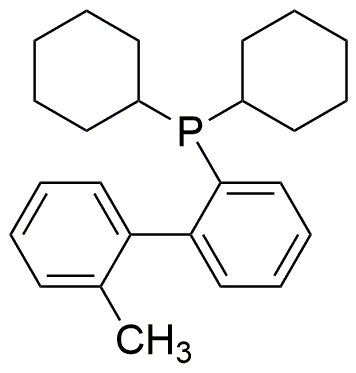MePhos is widely utilized in research focused on:
- Catalysis: It serves as an effective ligand in various catalytic processes, particularly in cross-coupling reactions, enhancing reaction rates and selectivity.
- Pharmaceutical Development: Its unique properties make it valuable in the synthesis of complex organic molecules, aiding in the development of new drugs.
- Material Science: MePhos is used in the formulation of advanced materials, contributing to the creation of polymers with improved mechanical and thermal properties.
- Environmental Chemistry: It plays a role in the development of green chemistry practices, helping to reduce waste and improve the efficiency of chemical processes.
- Research and Development: MePhos is a key component in academic and industrial research, facilitating the exploration of new chemical pathways and reactions.
General Information
Properties
Safety and Regulations
Applications
MePhos is widely utilized in research focused on:
- Catalysis: It serves as an effective ligand in various catalytic processes, particularly in cross-coupling reactions, enhancing reaction rates and selectivity.
- Pharmaceutical Development: Its unique properties make it valuable in the synthesis of complex organic molecules, aiding in the development of new drugs.
- Material Science: MePhos is used in the formulation of advanced materials, contributing to the creation of polymers with improved mechanical and thermal properties.
- Environmental Chemistry: It plays a role in the development of green chemistry practices, helping to reduce waste and improve the efficiency of chemical processes.
- Research and Development: MePhos is a key component in academic and industrial research, facilitating the exploration of new chemical pathways and reactions.
Documents
Safety Data Sheets (SDS)
The SDS provides comprehensive safety information on handling, storage, and disposal of the product.
Product Specification (PS)
The PS provides a comprehensive breakdown of the product’s properties, including chemical composition, physical state, purity, and storage requirements. It also details acceptable quality ranges and the product's intended applications.
Certificates of Analysis (COA)
Search for Certificates of Analysis (COA) by entering the products Lot Number. Lot and Batch Numbers can be found on a product’s label following the words ‘Lot’ or ‘Batch’.
Número de catálogo
Número de lote/lote
Certificates Of Origin (COO)
This COO confirms the country where the product was manufactured, and also details the materials and components used in it and whether it is derived from natural, synthetic, or other specific sources. This certificate may be required for customs, trade, and regulatory compliance.
Número de catálogo
Número de lote/lote
Safety Data Sheets (SDS)
The SDS provides comprehensive safety information on handling, storage, and disposal of the product.
DownloadProduct Specification (PS)
The PS provides a comprehensive breakdown of the product’s properties, including chemical composition, physical state, purity, and storage requirements. It also details acceptable quality ranges and the product's intended applications.
DownloadCertificates of Analysis (COA)
Search for Certificates of Analysis (COA) by entering the products Lot Number. Lot and Batch Numbers can be found on a product’s label following the words ‘Lot’ or ‘Batch’.
Número de catálogo
Número de lote/lote
Certificates Of Origin (COO)
This COO confirms the country where the product was manufactured, and also details the materials and components used in it and whether it is derived from natural, synthetic, or other specific sources. This certificate may be required for customs, trade, and regulatory compliance.


